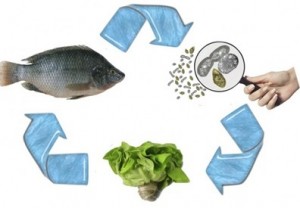
Aquaphonics being adapted successfully
The Marine Products Export Development Authority (MPEDA) has launched a project to promote aquaponics, a highly admired food production system in various countries, in Kerala India.
Fish and plants are grown in a symbiotic balance. Wastes from the fish provide nutrients for the plants, and in turn the plants filter the water for the fish. Plant off cuts can then be composted in wormeries to provide food for the fish and so the cycle continues… Crops are constantly harvested and the system feeds and watering itself in a sustainable ecosystem approach to food production. Surround the system with a greenhouse, add lady birds and other beneficial insects and a microcosm is born.
A sustainable way of farming food using very few inputs to produce a wide range of healthy and high value foods all year round. The growing of fish, or other aquatic organisms with plants in a controlled environment, optimising energy, water and nutrient use to produce the maximum amount of protein and vegetables in a given area. Fish wastes provide nutrients for the plants which in turn act as a harvestable filter system, cleaning the water so it can be continuously recycled. Off-cuts from plants are composted and the worms fed to the fish creating a completely closed-loop production system.
90% less water use than conventional agriculture and combined technologies minimise energy use & systems often incorporate renewable energy technologies with no fertilisers or herbicides required & pesticides are replaced with biological control. Fish meal replaced with worms and insects from composting of plant off-cuts. Maximum plant densities and year round growing huge yields.
Aquaponics can be described as ‘closed-loop’ production in that it has the capacity to provide all inputs to the system within the system itself and to recycle its own wastes. For this reason the applications of aquaponics are almost endless… it does not require fertile soil or large water inputs and so can be practiced almost anywhere. The ecosystem approach to farming lends itself well to conservation and development projects and also to education. Systems provide interactive hands-on learning environments and offer a wide range of activities for learning and teaching in multiple subjects, carrying with it important principles about natural cycles, farming and recycling.
The fish waste provides an organic food source for the plants. In return, plants provide a natural filter to the water in which fishes live. The third participants are the microbes and composting red worms, which convert ammonia from the fish waste first into nitrites, then into nitrates and the solids into vermicompost.

